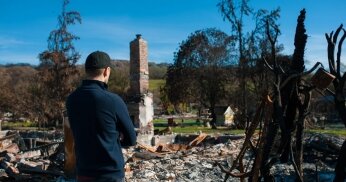 Home Insurance
Home InsuranceWhat is additional living expenses coverage, and do you need it?
When disaster strikes and your home is no longer safe to live in because of a fire or a natural disaster like a flood, k...

Compare and find the lowest Saskatchewan property insurance rates, save up to 32%.*
Get quotes from 50+ Canadian providers in 3 minutes.
have compared rates and saved money over the last 24 hours
First, we need to know about you and your home. It only takes 3 minutes, and it’s 100% confidential.
Next, we’ll show you quotes from 50+ Canadian providers. It’s free, with no commitment.
When you find the best quote, secure your Saskatchewan home insurance rate by talking to a licensed broker or agent.
Whether you live in a house, apartment, or condo, insuring your property and its contents is one of the smartest personal finance moves you can make. But finding the right home insurer shouldn’t be a rushed decision. Different lenders are going to offer you different rates, which is why you — and your pocketbook — will benefit from shopping around.
LowestRates.ca compares home insurance rates in Saskatchewan and connects you with the company offering you the best rate. But as the future holder of an insurance policy, you still need to figure out what your needs are. And that means asking the right questions. We’ll try to answer them on this page.
Your home insurance policy will be customized to suit your needs and the property you’re insuring.
Home insurance premiums are determined by dwelling type (is it a single-detached home, a house with a basement tenant suite, or a condo?). Insurance companies also try to predict the kind and size of claim you might make in the future.
Here are some of the criteria insurance companies look at when calculating your premium.
Home insurance covers the cost to replace the structure of your home — not its market value.
What kind of factors influence the cost of your premium? Lots, actually. Insurance is all about risk, so insurers want to know if there’s anything about your home that might make you more likely to file a claim.
To determine your premium, insurers will take into account:
In Saskatchewan, some insurers will factor in your credit score when determining your premium. In other words, they use your credit score to determine what kind of risk you might be to them in the insurance world — the idea being that credit score is a strong indicator of how responsible you are.
This is called your “insurance score.” Some insurers may even offer discounts for a good insurance score. Your credit score will only be used to determine whether you qualify for premium discounts, not increases.
Saskatchewan is most at risk for drought and major storm events, followed by forest fires and winter storms. Saskatchewan sees mountain runoff in the summer months, plains runoff in the spring, and lake flooding from April through July. The Saskatchewan River is also known for flooding, which puts most of the province’s large communities at risk. Flooding is fast becoming the top environmental concern facing homeowners.
Extreme temperature fluctuations
Saskatchewan sees harsh winters and hot summers where temperatures can fluctuate anywhere from -45 C in the winter all the way up to 45 C in the summer. Extreme cold can freeze and damage the pipes in a home, which can result in water damage. Sudden, unexpected thaws in winter and spring can cause pipes to burst.
Regions at highest risk: Densely populated areas in the south, such as Regina and Saskatoon, where roughly half the province’s population lives, would be most at risk for these types of weather events.
Tornadoes
Saskatchewan’s vast swaths of prairie land also provide the ideal conditions for severe thunderstorms and tornadoes to form during warmer months. In fact, of all the provinces, Saskatchewan has the highest number of annual tornadoes, averaging about 18 a year. Southern Saskatchewan, in particular, is one of the country’s most active tornado corridors. Hail and strong winds can result in damage to roofs and even structural collapse.
Regions at highest risk: Densely populated areas in the south, such as Regina and Saskatoon, where roughly half the province’s population lives, would be most at risk for these types of weather events.
Home insurance policies fall under these four basic categories:
Comprehensive - The most extensive and costly home insurance policy available, it covers your home’s structure and the contents within it from all perils and losses, save for any perils that have been explicitly left out of your policy.
Basic or Named Perils - This type of home insurance policy only insures your house and personal property against perils that are specifically named within the policy.
Broad - A broad home insurance policy insures your house for all risks of direct physical loss or damage unless excluded. It also offers protection for your personal property, but only against named perils. A broad policy is generally considered to be a good middle ground between a comprehensive and basic policy.
No-Frills - Very basic coverage for properties that don’t meet normal underwriting standards.
Personal liability coverage is usually included in home insurance policies. This covers you if you’re held liable for unintentionally causing bodily injury or property damage to other people.
On the other hand, coverage for floods and sewer backups is not included in home insurance policies. Protection against these threats is available, but only in the form of add-ons coverages, which are called riders or endorsements.
Home insurance in Saskatchewan is regulated by the Superintendent of Insurance. Its job is to licence insurance agents, regulate insurance products and market conduct according to the Saskatchewan Insurance Act. The Superintendent of Insurance falls under the Financial and Consumer Affairs Authority (FCAA) of Saskatchewan, which is Saskatchewan's financial and consumer marketplace regulator.
Consumers can access the Superintendent of Insurance to read up on Saskatchewan insurance legislation and basic insurance information, confirm whether your agent is licensed to sell insurance, find out whether an insurance professional has ever been disciplined, and learn how to file a complaint.
If you have a dispute with your home insurer, these are your options:
If you have a complaint against your insurance agent specifically, contact the Insurance Councils of Saskatchewan.
Of course, there’s no clear-cut answer to this question, since it will be different for everyone. The most important thing is finding an insurance company and policy that suits your individual needs.
Some of the major insurance companies operating in Saskatchewan are:
Always compare rates before you decide on an insurer. It’s your first — and best — defence against overpaying.
Do some research on potential insurers, too. See if they’ve received any complaints through the Better Business Bureau. Use the Superintendent of Insurance’s website to find out if regulatory action has been taken against an insurance professional. And when you do speak with a broker, pay attention to how they make you feel. You should never be pressured into buying a policy.
 Home Insurance
Home InsuranceWhen disaster strikes and your home is no longer safe to live in because of a fire or a natural disaster like a flood, k...
 Home Insurance
Home InsuranceAlthough Canada has never been a stranger to extreme weather events, such events have undoubtedly been on the rise in re...
*Shoppers who obtained a property quote on LowestRates.ca from January to December 2023 saved an average of 32%. The average savings percentage represents the difference between the shoppers’ average lowest quoted premium and the average of the second and third lowest quoted premiums generated by LowestRates.ca. Excludes tenant and condo insurance.